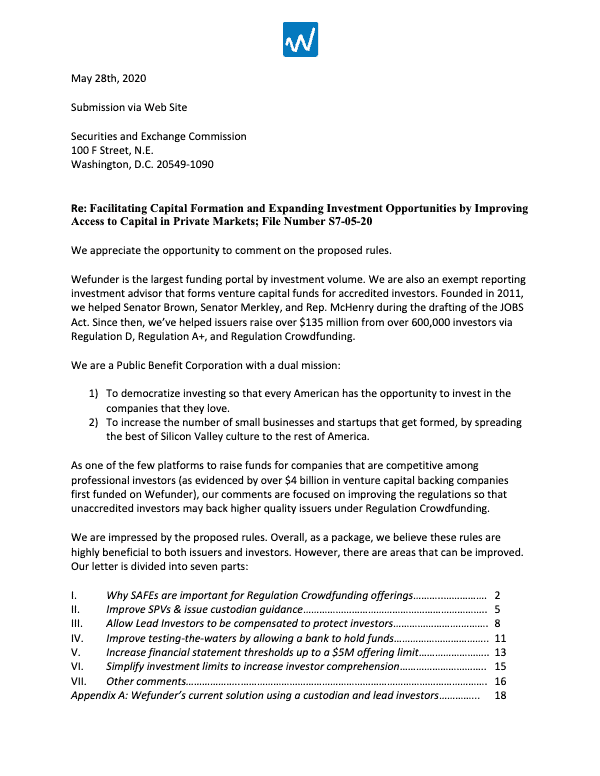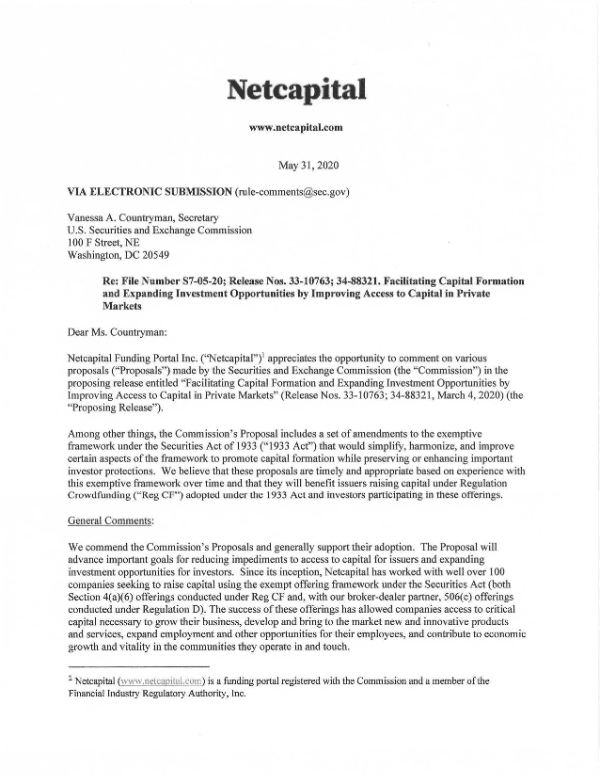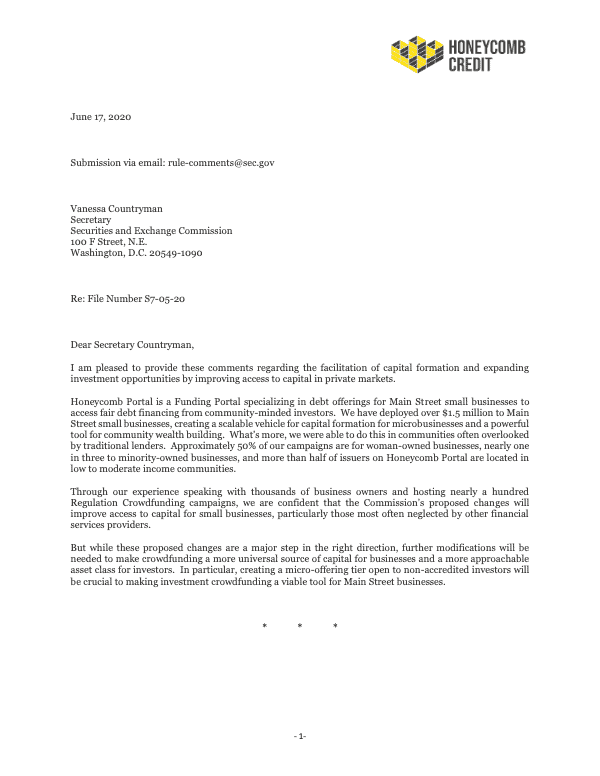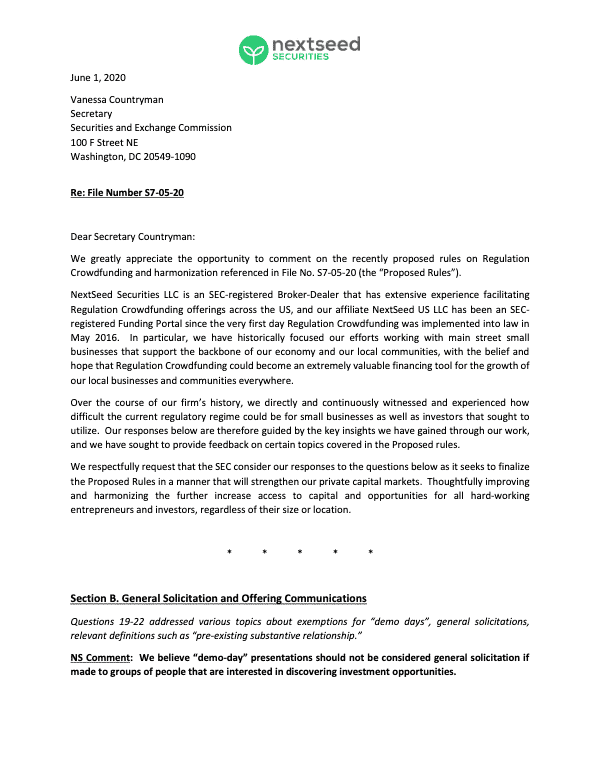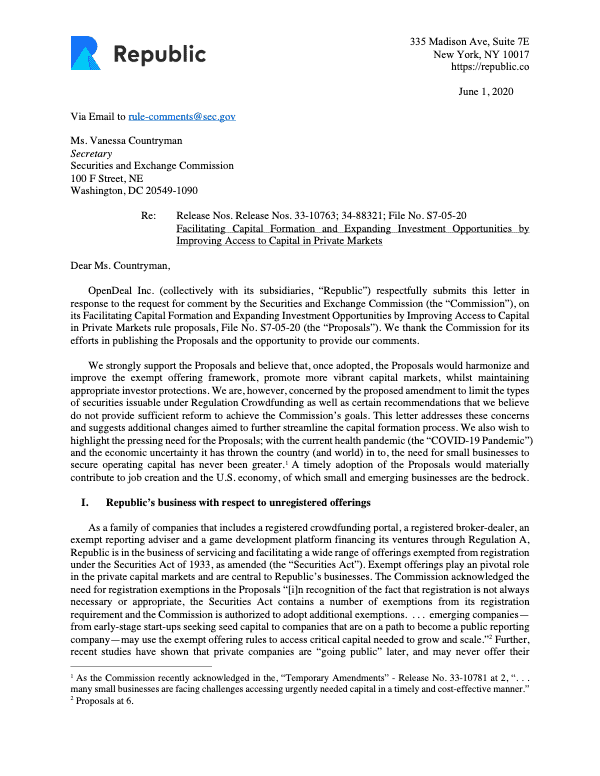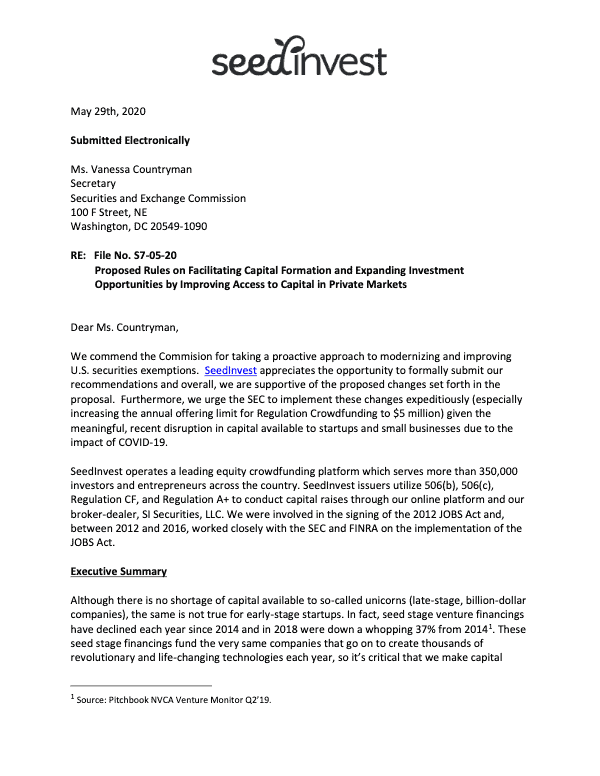
Not too long ago, the Securities and Exchange Commission (SEC) concluded the comments phase of a proposal to update, and hopefully improve, rules pertaining to the exempt offering ecosystem. This includes Reg A+, Reg CF, and Reg D (506c), each a variant of online capital formation (crowdfunding).
The actual proposed rule change, “Facilitating Capital Formation and Expanding Investment Opportunities by Improving Access to Capital in Private Markets,” was first published last March.
At the time of the announcement, SEC Chairman Jay Clayton said that emerging companies, from early-stage start-ups seeking seed capital to companies that are on a path to become a public reporting company, use these exemptions “to access critical capital needed to create jobs and scale their businesses.” But, over time, the rules have become overly complex and difficult to utilize – especially for smaller firms that lack the resources more established firms can tap into.
As we all know, smaller firms and entrepreneurs are vital to the economy and thus facilitating access to capital is a key policy goal.
The proposed changes include a much-needed increase to Reg CF from the current anemic $1.07 million to a more viable $5 million funding cap. Reg A+ may be inched up from its current $50 million maximum to $75 million. There are other proposed rule changes that will have a material impact on capital formation if enacted. Many of these proposals are quite good but some adjustments will be necessary to put it all together in a workable package.
So in the ensuing months since the proposal was opened up to comments what have the crowdfunding platforms had to say?
FINRA regulated funding portals and broker-dealers offering exempt securities probably have the best vantage point as to what must be done to improve the funding ecosystem. These platforms know that a successful ecosystem is one that benefits all constituent participants: the issuer, the investor, and the offering platform. The SEC must align the interests of each of these vital variables to foster a robust crowdfunding industry.
Below, Crowdfund Insider has consolidated just a few of the comments and perspectives provided by the various online investment platforms that have submitted their opinions based on valuable, real world experience.
Christian Bilger, Chief Operating Officer of Honeycomb Credit, a funding portal that operates like a bank replacement platform, advocated on behalf of a micro-exemption:
“Through our experience speaking with thousands of business owners and hosting nearly a hundred Regulation Crowdfunding [Reg CF] campaigns, we are confident that the Commission’s proposed changes will improve access to capital for small businesses, particularly those most often neglected by other financial services providers. But while these proposed changes are a major step in the right direction, further modifications will be needed to make crowdfunding a more universal source of capital for businesses and a more approachable asset class for investors. In particular, creating a micro-offering tier open to non-accredited investors will be crucial to making investment crowdfunding a viable tool for Main Street businesses.”
Bilger advocates allowing for “micro-offerings” for debt instruments under $250,000 something he believes will unlock Reg CF’s potential to “create a meaningful level of capital formation for small businesses.”
Ryan Feit, CEO and co-founder of SeedInvest, told the Commission the funding cap regarding Reg CF was too low.
“Entrepreneurs looking to raise capital broadly for their startups and small businesses can turn to Regulation Crowdfunding [Reg CF] to raise their first $1 million. As those companies grow, Regulation A+ can be a great tool for raising $20+ million, but it is an expensive, time consuming, and burdensome proposition for raising less than that. Obtaining audited financial statements, completing a Form 1A, undergoing the lengthy SEC qualification process, and then agreeing to ongoing, semi-annual public reporting is a lot to swallow for a company looking to raise $2 million or $5 million. On November 17, 2016, we presented at the 2016 SEC Government-Business Forum on Small Business Capital Formation on this exact issue- that entrepreneurs who need to raise between $1-$20 million are currently not served by existing securities exemptions. This is especially true regarding startups and small businesses which need to raise between $1-$5 million. Over the last eight years, this is the range where SeedInvest has seen the most companies in need of capital and also where the cost and burden of utilizing Regulation A+ is the hardest to justify.”
Some industry insiders believe Reg CF should be pushed up all the way to that $20 million amount to make it even more viable.
The founding Chairman of the Association of Online Investment Platforms (AOIP) and CEO of NextSeed Youngro Lee, along with Counsel Vivian Kim, said that accredited investor verification for Reg D (506c) offerings needed to be removed:
“The fact that the SEC requires a higher burden of Accredited Investor verification for a 506(c) offering than a 506(b) offering most definitely impacts issuers’ willingness to utilize 506(c). We have received many complaints from investors who submit information to be verified as accredited investors for Rule 506(c) offerings that the process is more onerous than when they participate in higher-minimum investments under 506(b), which they typically consider to be more complex offerings. Many investors refuse to provide their personal information such as income or net worth information in order to invest in a 506(c) offering, since they never have to provide such in 506(b) offerings. There should not be any difference of verification standard between 506(b) and 506(c) offerings. The SEC has not provided clear guidance on what “reasonable verification” means in a 506(c) offering, relative to a 506(b) offering, and as such issuers and broker-dealers facilitating 506(c) offerings are forced to rely on the narrowly defined safe harbor requirements. In this context, the net worth requirement and amount of documentation required to verify net worth, along with the short validity (3 months), puts excessive burden on the investor because of investors’ hesitancy on providing such private information as well as the fact that 506(c) offerings often take far longer than 3 months to complete. The 3-months period means that investors may need to submit information at time of original commitment (where closing has not yet occurred), and then again at time of actual closing of the investment round.”
Reg D (506c), the exemption that allows “general solicitation” – or crowdfunding, has underperformed expectations. Most everyone attributes this to the verification burden. Reg D (506b), an exemption that does not require verification but does not allow promotion, is the most successful exemption utilized today with an annual market estimated at over $1 trillion.
Maxwell R. Rich, Deputy General Counsel at Republic, concurred with others advocating on behalf of increasing Reg CF to $5 million but preferred to see it go higher – perhaps to $10 million. Rich said the Commission was misguided in its attempt to remove SAFEs as an offering option. SAFEs are widely utilized by funding portals today.
Rich also highlighted shortcomings in the proposal to allow Special Purpose Vehicles (SPVs) by Reg CF issuers. SPVs have long been requested by platforms but the inclusion needs some nuance regarding final rules. Rich said the current SPV proposal would fall short and be too expensive:
“Under the Proposals, the SPVs would be limited in utility and, as such, expensive and cost-prohibitive for many issuers because (1) the proposals require that they be organized and operated for the sole purpose of acquiring, holding, and disposing of securities by a single issuer, (2) they preclude SPVs from borrowing money or from using the proceeds of sales to do anything but purchase a single class of securities from a single crowdfunding issuer, and (3) SPVs would be permitted to issue only one class of security.”
Questions remain regarding follow on rounds and the ability of investors in an SPV to participate.
“Additionally, the proposed changes would increase the cost of offerings under Regulation Crowdfunding [Reg CF] by (1) requiring issuers to provide an undertaking upfront in order to fund the expenses of the creation and operation of SPVs, (2) requiring the SPVs to vote the crowdfunding issuer securities and to participate in tender or exchange offers, (3) forcing SPVs to deliver all disclosures directly to investors and potential investors39 and (4) due to the tax code, requiring the delivery of K-1s to potentially thousands of investors every year, regardless of profits earned by such investors, which could cost an issuer thousands of dollars per year. As proposed, SPVs should not be considered a viable alternative for many issuers due to the hardships imposed and the limited benefits provided to investors, and would therefore not alleviate the harms caused by restricting the offer and sale of SAFEs and other alternative instruments. We believe the Commission’s proposal to discontinue the use of SAFEs or limit its use to certain types of businesses would deter issuers from fundraising under Regulation Crowdfunding and would not strengthen investor protection beyond the existing robust disclosure framework.”
David Duccini, CEO and founder of Silicon Prairie, asked the Commission to get review state Blue Sky rules.
In the US, there is both federal oversight and state oversight of securities offerings. At times, this state oversight (Blue Sky rules) overlaps generating additional cost for issuers/investors with few benefits.
Duccini stated:
“We are hereby asking the Commission to do a study, if within its authority, on what we are calling “Clear Skies” which is essentially the sunsetting of all Blue Sky laws. In a post Internet era, any leverage once enjoyed through information asymmetry has largely evaporated. Furthermore, the application of the Uniform Securities Act (“USA”) is inconsistently applied and can cause unnecessary delays, costs and friction and in our own case, actually harmed the formation of capital. In our own state of Minnesota we have been subjected to arbitrary and capricious treatment by our administrator, the Department of Commerce, who to this day still believes they have the authority to “approve” registrations — as opposed to the simple recognition that they either make things “effective” or not. This is in part likely due to the fact that those in positions of authority appear to have very little actual knowledge, experience, or training in the business of securities. We doubt many of them have even passed the Series 63 for which they require of agents and broker-dealers operating in this state. Furthermore, they seem to be of the opinion that they can “weaponize” their attention, and during the run up to a planned administrative hearing regarding an intrastate Broker-Dealer we formed in part to lower the cost of capital under the MNvest exemption, we discovered through exhibits filed that department staff had taken 500-600 screen shots of our social media. To what end or purpose we may never know, but can only surmise that they were trying to intimidate us.”
Netcapital CEO Jason Frishman addressed the requirement of Reg CF issuers to file an annual report. According to the current rule, an issuer that sold securities in a Reg CF offering must provide an annual report no later than 120 days after the end of its fiscal year. The report must be filed on EDGAR and posted on the issuer’s website and thus available to the public. Frishman believes that an annual report is too onerous for many smaller issuers advocating for a change of the requirement:
“Under this proposal, while investors would not have the benefit of updated financial reporting, they would receive updates for all of the other items of information set forth in Rule 202(a) that must be addressed in an annual report; issuers would be relieved of providing the most sensitive information that today may be acting as the main deterrent to producing ongoing annual reports. Under this proposal, except for investors in issuers which meet the conditions of Rule 202(b)(l), (4) or (5), all investors in Reg CF offerings would continue to receive some form of ongoing, current reporting through an annual report from an issuer.”
Of note, Frishman welcomed the proposed increase of Reg CF to $5 million but clearly would like to see a higher cap. Frishman asked that the Commission facilitates limits that are competitive to other jurisdictions where limits can be higher.
Nicholas Tommarello, CEO and founder of Wefunder bulleted out his requests to improve the exempt offering ecosystem.
- Why SAFEs are important for Regulation Crowdfunding offerings
- Improve SPVs & issue custodian guidance
- Allow Lead Investors to be compensated to protect investors
- Improve testing-the-waters by allowing a bank to hold funds
- Increase financial statement thresholds up to a $5M offering limit
- VI. Simplify investment limits to increase investor comprehension
- And more
 Tommarello, a long time advocate access to opportunity for diverse issuers as well as investors, told the Commission a venture type model is needed to align interests:
Tommarello, a long time advocate access to opportunity for diverse issuers as well as investors, told the Commission a venture type model is needed to align interests:
“Right now, the entire Regulation Crowdfunding [Reg CF] ecosystem has a clear incentive: “Pump and dump every company that might be able to raise money, and then forget about helping those companies succeed.” This is the outcome of an industry that makes money primarily on up-front transaction fees, with very little stake in eventual success. The industry would be better served by incorporating an element of the venture capital model, which has proven to be a great wealth-creation engine for helping startups grow. We would ban management fees (all capital of Reg CF investors should be invested in the company), but strongly advocate that it is in the public interest to allow retail investors the right to decide to hire an entity to help their investments succeed, compensated with a performance-based fee that works like carried interest: investors only pay if they earn a return.”
Most of the recommendations coming from crowdfunding platforms had a high degree of overlap across each comment letter. As these are the constituent parties with the most experience in the online capital formation sector for early stage firms, one would expect that the Commission will give additional weight to their recommendations. The SEC is expected to announce approved changes before the end of the year.
More in the coming days.


 “The fact that the SEC requires a higher burden of Accredited Investor verification for a 506(c) offering than a 506(b) offering most definitely impacts issuers’ willingness to utilize 506(c). We have received many complaints from investors who submit information to be verified as accredited investors for Rule 506(c) offerings that the process is more onerous than when they participate in higher-minimum investments under 506(b), which they typically consider to be more complex offerings. Many investors refuse to provide their personal information such as income or net worth information in order to invest in a 506(c) offering, since they never have to provide such in 506(b) offerings. There should not be any difference of verification standard between 506(b) and 506(c) offerings. The SEC has not provided clear guidance on what “reasonable verification” means in a 506(c) offering, relative to a 506(b) offering, and as such issuers and broker-dealers facilitating 506(c) offerings are forced to rely on the narrowly defined safe harbor requirements. In this context, the net worth requirement and amount of documentation required to verify net worth, along with the short validity (3 months), puts excessive burden on the investor because of investors’ hesitancy on providing such private information as well as the fact that 506(c) offerings often take far longer than 3 months to complete. The 3-months period means that investors may need to submit information at time of original commitment (where closing has not yet occurred), and then again at time of actual closing of the investment round.”
“The fact that the SEC requires a higher burden of Accredited Investor verification for a 506(c) offering than a 506(b) offering most definitely impacts issuers’ willingness to utilize 506(c). We have received many complaints from investors who submit information to be verified as accredited investors for Rule 506(c) offerings that the process is more onerous than when they participate in higher-minimum investments under 506(b), which they typically consider to be more complex offerings. Many investors refuse to provide their personal information such as income or net worth information in order to invest in a 506(c) offering, since they never have to provide such in 506(b) offerings. There should not be any difference of verification standard between 506(b) and 506(c) offerings. The SEC has not provided clear guidance on what “reasonable verification” means in a 506(c) offering, relative to a 506(b) offering, and as such issuers and broker-dealers facilitating 506(c) offerings are forced to rely on the narrowly defined safe harbor requirements. In this context, the net worth requirement and amount of documentation required to verify net worth, along with the short validity (3 months), puts excessive burden on the investor because of investors’ hesitancy on providing such private information as well as the fact that 506(c) offerings often take far longer than 3 months to complete. The 3-months period means that investors may need to submit information at time of original commitment (where closing has not yet occurred), and then again at time of actual closing of the investment round.”